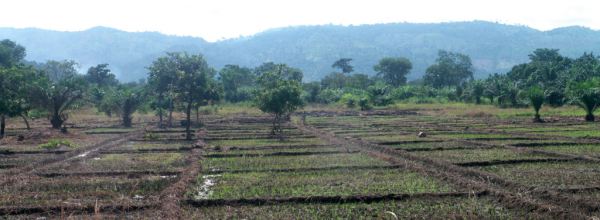SMART-valleys approach
Agricultural potential in inland valleys
Inland valleys are common landscapes found in Africa. They are often preferred by farmers, based on relatively high and secure water availability and high soil fertility levels compared to the surrounding uplands. Moreover, they are an attractive alternative for farmers in the light of climate variability and climate change. Rice is the most suitable crop cultivated on the inland valley bottoms, whereas on the fringes one often finds a variety of crops including maize, soya, yam and tree crops. These landscapes play a pivotal role in attaining the regional objectives of food security and poverty alleviation.
Smart-valleys
The SMART-valleys development approach was developed by AfricaRice and its national partners. It can be characterized as participatory, low-cost and easy to replicate. Moreover, it is a relatively fast development approach since all steps in the development process can be implemented within one agricultural season.
Using the Smart-valleys development approach farmers design and implement a system that includes:
- drainage canals
- irrigation infrastructure (where water resources are available)
- bunded and leveled rice fields in the inland valleys
Improved water management leads consequently to lower risks of drought and inundations. Bunding of fields and land leveling result in increased water retention and improved crop growth. It was found that the farmers who are less exposed to environmental risks are ready to invest more in good seeds, fertilizers and other inputs. Farmers in Benin and Togo report that their rice yields doubled to on average 3.5 to 4 tons/ha under rain fed conditions. Impact studies revealed also that the farmers’ incomes doubled compared to the traditional way of rice farming.
Capacity building
AfricaRice and its national partners are developing an instruction package that will contain and instruction guide, a field guide and an educational video for successful implementation of the SMART-Valleys approach. During the project cycle hundreds of farmers have been trained in the approach. Lead-farmers and field technicians of the responsible Ministries, extension services and development NGO’s in Benin and Togo. The training curriculum that was used will be improved and incorporated in the instruction guide. An educational video has been developed yet and can be viewed in English and French:
French
English
The films will be translated to local languages in Benin, Togo, Sierra Leone and Liberia. Please do not hesitate to request copies on DVD (s.zwart@cgiar.org).
Further reading
An essential paper providing a sustainable approach for inland valley development was published recently:
- Rodenburg, J, SJ Zwart, P Kiepe, LT Narteh, W Dogbe, MCS Wopereis, 2014. Sustainable rice production in African inland valleys: seizing regional potentials through local approaches. Agricultural Systems 123, pp 1-11.
The paper below provides an analysis of irrigation developments in Benin and the reasons for failure and for success:
- Djagba, JF, J Rodenburg, SJ Zwart, CJ Houndagba, P Kiepe, 2014. Failure and success factors of irrigation system developments: a case study from the Ouémé and Zou valleys in Benin. Irrigation and Drainage 63(3), pp 328–329.
Unfortunately these papers are not open-access, but kindly send an email (s.zwart@cgiar.org) with your request and we may provide you copies.

